7/25_Female_I really miss drawing_homophobes, proships, bigots DNI fuck you you're not welcome here_ 🍉🍉🍉
Last active 60 minutes ago
Don't wanna be here? Send us removal request.
Text
Why does nobody seem to realize that Tadc might be a situation similar to SOMA
I mean, when we see the computer from the outside at the end of the pilot, Pomni's real body isn't there wearing the headset, and since the others have been trapped in the circus for much longer, their bodies would have died from lack of food and water, But there aren't any corpses surrounding the computer either.
So it's very likely they actually didn't get sucked into the game at all, but the headset copied their memories (minus their names) and personality onto an AI before dumping it in the circus. Meanwhile their real bodies thought nothing happened and just left the building.
This of course makes it more existentially depressing, because even if the cast find a way out, they have nothing to return to. They aren't really themselves, but copies, the life they remember wasn't really theirs to begin with, and they don't have physical bodies to live in the real world with anyhow. So even if there is an exit, they still can't leave, heck there wouldn't be a point in trying.
6 notes
·
View notes
Text
this is something shii ayato would give to thoma for shits and giggles

#genshin impact#kamisato ayato#thoma#thomato#genshin ayato#genshin thoma#random ass post#meme#random post
4 notes
·
View notes
Text
Hymn of Philosophy
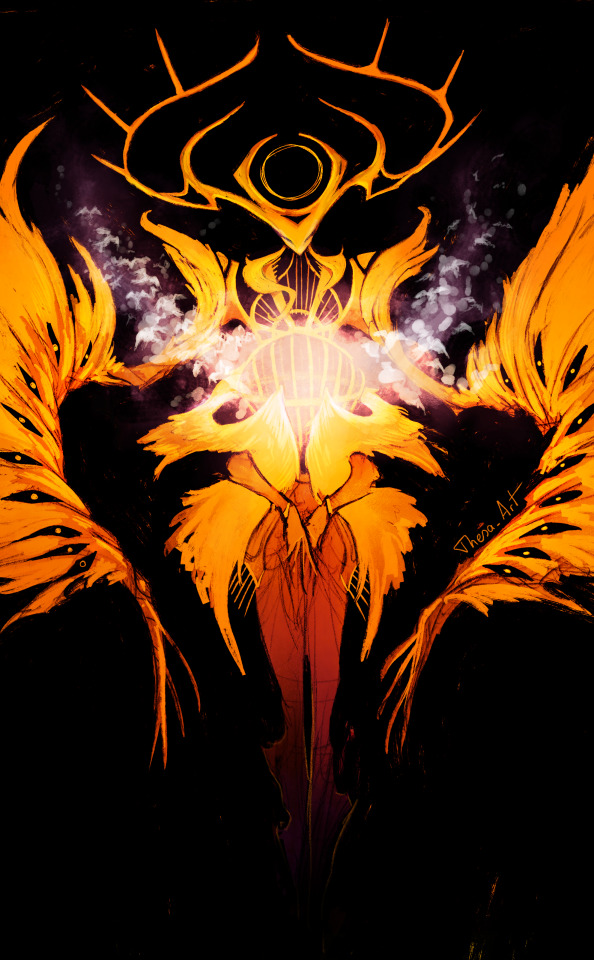
Sunday
320 notes
·
View notes
Text
ok, nerd moment.
So, Sunday's boss fight, specifically 2nd phase, does give some information about how Aeons ascend — or at least the process of Ascension. In particular, the idea of "The Embryo" where Sunday was actually close to Ascension and like with every Aeon that ascended recently, caused a major event with his ascension. We know that most ascensions if not all have an event accompanying it — Xipe's caused mass assimilation and Nanook's caused planetary destruction and Sunday's would have brought the SweetDream Paradise (Eternal Slumber)
so that's neat. We just stopped an Aeon from ascending and the worst part is — Sunday had no clue he was ascending, it wasn't his intention to.
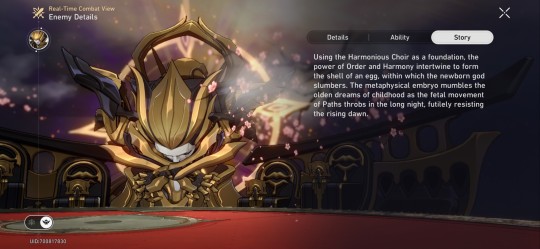
2K notes
·
View notes
Text
person in fandom: eeeyikes!!! i hope im writing this character in this short little fanfic right >_< eeekkk what if my takes on my meta are all wrong and everyone will Kill me!!
guy in professional comic industry: okay lets mischaracterize every single character that appears in this comic for 50 or so issues
28K notes
·
View notes
Text
Just saying that, if you are the type of person to say, "Jesus said to love everyone, even if we disagree with what they are doing" or "love the sinner, hate the sin." If you say these phrases and still act as a pinnacle of peace and promote yourself as a Christian, you should not be interacting with LGBTQ+. Unless your position is that it is NOT a sin, regardless of what is being discussed, then you should stay away from me. You aren't "progressive" for claiming to love a group of people you still believe are going to be damned to hell for something they cannot control. There is no route of neutrality you can take with this. And if you are a person with these beliefs that has LGBTQ+ friends, that's a fault of your own, not theirs.
(this does not apply whatsoever to lgbtq Christians. Not me personally, but I love you all and am proud of us)
48 notes
·
View notes
Text
also I hate those mfs who defend these types of shit like "i-it's their belief!! let's re-respect them 😢" like no having a belief isn't an excuse to be a fucking bigot
(also there's already something wrong about your "religion" having rules about alienating a minority by calling it a "sin")
Hateful Christians piss me the fuck off..
I just saw a post on TikTok saying “hey it’s almost June! We’re giving out free pride flags!” ..obviously there was TONS AND TONNNNSSSS of hate comments. One of them in particular stood out to me.
A queer person commented and said “you all know it’s possible to be gay and Christian.. right? I’m happier than ever.” A woman replied and said, “no, it’s not. You’re embracing sin. Not repenting it.”
Bitch.. what? Says the woman who’s hating on someone? Says the woman who’s going out of her way to comment on a post out of DISRESPECT for human beings just like herself? She commented other things on that post, all of them disrespectful and outright homophobic.. yet she has the GALL to say that the INNOCENT person who’s trying TO EDUCATE people like her is sinning when she’s the one who’s spreading rude, insensitive, and terrible comments on a post that was trying to uplift people who are struggling. Struggling because people like her exist.
What happened to love thy neighbor, huh?
15 notes
·
View notes
Text
Eternal Punishment: Ideology, Performance, and Martyrdom as Sunday's Expressions of the Death Drive
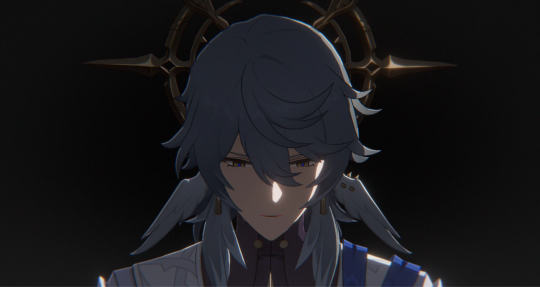
“Sleep sleep happy child. All creation slept and smil’d. Sleep sleep, happy sleep, While o’er thee thy mother weep” -William Blake, “A Cradle Song,” Songs of Innocence and of Experience “So, where is my dream?” “It is a continuation of reality.” “But where is my reality?” “It is at the end of your dream.” -The End of Evangelion (1997)
Considering the majority of his development occurred in Penacony’s third act, Sunday has proven himself as a compelling antagonist who rivals both Takuto Maruki (Persona 5 Royal) and Kevin Kaslana (Honkai Impact 3rd) in grandiosity and pessimism. Although his motivations and methods closely resemble theirs, the tragic path that led Sunday to his rigid belief system began when he was still a child and is intimately related to his experience with family. Having both witnessed the suffering of others and experienced it himself, Sunday’s ideology was born with a single purpose: to shelter humanity from the pain of reality. His answer to life appears rational on its surface and is constructed with kind intentions, but in practice it would have damned the cosmos to a purgatorial world of constancy and doomed its creator to infinite loneliness. It is this tension between Sunday’s intentions and the truth of his actions that fascinates me, because it reveals a deeper conflict within him that is also at the center of Penacony’s story. Here, I’ll use some of Freud’s psychoanalytic theories to illustrate what exactly that conflict is, and why it’s so important for a full understanding of both Penacony's finale and Sunday’s arc thus far.
Cohesion not guaranteed, my brain feels like swiss cheese after 2.2
Spoilers for the entire 2.2 Trailblaze Mission (In Our Time) and a small post-quest with Robin (The Feather He Dropped).
Disclaimer: All content in this post, especially the psychoanalysis, should be taken in the spirit of media analysis and nothing more. Also, corrections and additions are welcome, whether they are about interpreting Freud or HSR. :)
To cut down on post length, external sources (that is, any reading that is not official Star Rail material) are given as numbered in-text citations and gathered in a pastebin document linked at the bottom with the full title and exact page numbers of the source.
And before we begin, a huge thank you to my boyfriend for proofreading this numerous times despite not having played any Hoyoverse games, and for talking out the philosophy with me T_T That’s love right there!
Penacony, Freud, and the Occasion for the Death Drive


“The IPC does not care about its workers! I bet you they would love it if those monsters came and killed me. That way they wouldn’t have to pay for my pension!” “Sounds like somebody could use a Sprinkles cupcake!” -It’s Always Night in Penacony Show
It is impossible to avoid Sigmund Freud when discussing the psychology of dreams, and his psychoanalytic theories are tightly woven into nearly every aspect of Penacony’s environment and story. Our most salient point of entry into his work is The Family’s sweet dream, which embodies the base instinct in human nature towards pleasure-seeking behavior and instant gratification, even at the expense of self-preservation, also known as the pleasure principle.¹ Be it slot machines, luxury cars, decadent food, or endless shopping malls, everything in the sweet dream exists to further each guest’s pursuit of pleasure—such is the purpose of dreams, Freud theorized, as vehicles for wish-fulfillment.² “Death,” let alone pain, is not allowed to exist in the sweet dream in order to preserve that pleasure:
“A further incentive to a disengagement of the ego from the general mass of sensations–that is, to the recognition of an ‘outside’, an external world–is provided by the frequent, manifold and unavoidable sensations of pain and unpleasure the removal of which is enjoined by the pleasure principle, in the exercise of its unrestricted domination. A tendency arises to separate from the ego everything that can become a source of such unpleasure, to throw it outside and to create a pure pleasure-ego which is confronted by a strange and threatening ‘outside’” (Freud, 1930, p. 4).³ “One of the twelve Dreamscapes in Penacony, and its time coincides with midnight. Here, the dream's time is forever stuck at 00:00. Tomorrow will not come, and this night of revelry will never end” (Loading Screen: Golden Hour). Gallagher: …Think about this — what would it cost to create and maintain such a lavish dreamland? Gallagher: It's people's lives. The opulent dream is built upon the decay of spirits, with a toxic elixir called "pleasure" flowing through the Dreamscape. It tempts people to indulge in the Dreamscape, and gradually their minds succumb, becoming nourishment for the sweet dream. (The Public Enemy)
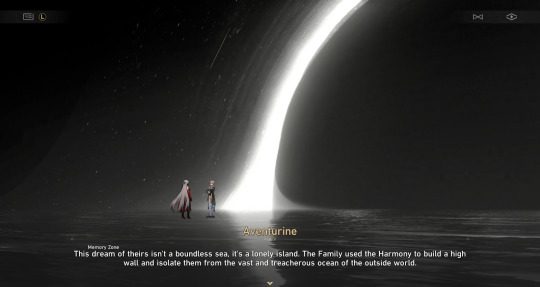
Aventurine: This dream [Memory Zone] of theirs isn’t a boundless sea, it’s a lonely island. The Family used the Harmony to build a high wall and isolate them from the vast and treacherous ocean of the outside world.
But “death” still lurks beneath the juvenile fantasy and its sweet commercial lies, in the yawning chasm proceeding spiritual death. This space, the Primordial Dreamscape, is a chaotic rendering of memories and emotions that goes beyond consumerism as the ultimate form of pleasure, and the high walls of the sweet dream separate each “Moment” from its depths. It is the original form of the sweet dream, its primitive reflection in the Memory Zone’s water, and the crystalline bodies of its memetic entities are like mirrors into the past inviting guests’ introspection.
Introspection is the Achilles’ heel of The Family’s superficial paradise, because curiosity about oneself redirects the ego’s interest from external objects to the inner abyss of thoughts and desires deemed unacceptable in reality, and remembering their existence reveals psychic pain. The Family’s denial of these ‘impure’ thoughts reflects the process by which the ego represses instinctual impulses to avoid that pain:
Robin: While I was away from Penacony, the boundaries of the Twelve Dreamscapes kept expanding outward. But whenever I mentioned the anomalies in my dreams... all The Family heads refused to talk about it. Only my brother was willing to respond... Robin: Later, I discovered the secret letters from the IPC ambassador, which further convinced me that there are hidden secrets beneath the surface of Penacony. So, following the clues in the Oak Family's dossiers, I found my way here... Robin: ...The land of the exiles, concealed by The Family under the guise of "Death", a dream within a dream where Penacony's past is buried. (Small Town Grotesque) “Life is parceled in impenetrable barriers, obstructing the intrusion of the alien. But beneath that ironclad shell, there is a region both nameless and fragile” (Memory Zone Meme “Heartbreaker” Story). “We are very apt to think of the ego as powerless against the id; but when it is opposed to an instinctual process in the id it has only to give a 'signal of unpleasure’ in order to attain its object with the aid of that almost omnipotent institution, the pleasure principle” (Freud, 1926, p. 92).⁴
Freud begins Beyond the Pleasure Principle (1920) by pointing out the foundational assumption of psychoanalysis, namely that all psychic processes serve the pleasure principle in infantile life and the reality principle at a later point of ego development. The reality principle arises from the ego’s instinct for self-preservation, and it redirects pleasure-seeking behavior so that one is willing to wait for its payoff. Rather than relying on dangerous sources of pleasure that provide instant gratification, instead the constraints of reality (or “time”) imposed on the ego and any consequent pain (or “tension”) are endured for the sake of eventual pleasure.⁵ For psychoanalysts, this only further cemented pleasure’s importance in mental life.
However, as World War I came to an end, Freud found these principles alone were insufficient to explain the purpose of trauma dreams in veterans returning from the battle front. Their dreams would faithfully recreate traumatic memories from the war each night, with no pleasurable payoff for the dreamer, and this directly contradicted Freud’s theory of dream interpretation.⁶ If trauma dreams did not fulfill the dreamer’s unconscious wishes, then they did not follow the pleasure principle; they seemed to serve some other purpose.
Though unconsciously repeating pain in waking life was not a new idea in psychoanalysis, trauma dreams highlighted a critical flaw in its understanding of this behavior’s ends. To untangle this complexity, Freud reexamined the aims of the “compulsion to repeat,” and speculated that it is not only an instinctual behavior, but also has an earlier origin than the pleasure principle. He then proposed a dualistic theory of desire that revealed something he believed was common to all organic life—that if there are life instincts, or what he called “Eros,” that are geared towards an organism’s pleasure and self-preservation, then there is also a primary death drive, or death instincts, that aims for its destruction:
Acheron: The Beautiful Dream is crumbling, but not because of a particular Aeon, a particular faction, or a particular visitor. Its collapse stems from a certain inevitability of human nature. The Family refuses to acknowledge this, and it has ultimately backfired and become a catalyst… Acheron: As people immerse themselves in the Dreamscape, where consequences and pain cease to exist, and only ease and pleasure prevail, they draw closer and closer to necrosis. Regardless of the perceived bliss, death looms as the inevitable conclusion. Acheron: Also, this necrosis will diffuse and spread. One piece of the puzzle’s mutation will eventually cause the entire building to shake, break…and crumble. Welt: …In the end, the dreams that people built in the name of freedom became the cage that imprisoned them. (When the Sacred Ginmill Closes)
The “inevitability” Acheron refers to is one and the same with the death instincts as illustrated through the Nirvana principle, originally proposed by psychoanalyst Barbara Low and adopted by Freud in Beyond the Pleasure Principle. Early on in the work, he identifies G. Th. Fechner’s principle towards stability, or the constancy principle, as a greater implication of the pleasure principle’s terms. According to this principle, the psychic apparatus (or ‘psychic processes’) aims not only to relax psychic tension to avoid pain, but also to keep tension low and constant.⁷ But this raises a problem: the pleasure principle’s express purpose is to avoid pain, but pleasure is a finite state that can only be felt as such if there is pain to reduce in the first place. If this balance is interfered with, we do not preserve the initial euphoria of pleasure infinitely, but instead find it dulled with time until it approaches ‘zero’:
“When any situation that is desired by the pleasure principle is prolonged, it only produces a feeling of mild contentment. We are so made that we can derive intense enjoyment only from a contrast and very little from a state of things” (Freud, 1930, p. 16).⁸
This ‘zero’-state is the aim of the Nirvana principle, where it is not just the reduction of excitation but rather its total elimination that is ultimately desired.⁹ In other words, its aim is stillness through the suspension of psychic processes, a state of being that could only find its analogue in dormancy,¹⁰ or something unto death. Acheron’s point is that this necrotic, empty feeling is not an accident, because “death” lays the foundation for something new.
And this, at last, brings us back to Sunday. Incongruence, fantasy, and wishful thinking are just some of what drives Sunday to create his ideal world, a paradise where every day is a day of rest. Though his methods are misguided and extreme, he does this out of compassion for the weak and a sense that he must catch them in his paradise before they crash to their death. In truth, this “paradise” was death in a different form, where reality is inverted with one’s personal fiction and conflict is transcended by removing choice. The conflict between the life instincts and death instincts is key to understanding how Sunday arrived at this answer to life’s pain, but to understand the depth of that conflict we must go beyond his facade and grasp the true meaning of his infantile fantasy. By employing a Freudian psychoanalytic reading of Sunday’s arc, I hope to open new avenues of discussion about both his character and the meaning of Penacony.
The Prison of Fate


“Is darkness equal to daylight? Are sinners equal to the righteous? If you are born weak, which god should you turn to for solace?” -Sunday, Everything that Rises Must Converge “You know, in the thick of things, people are blind to the grit in their eyes...yet they can always feel its scratch. Want the answer? I'll give it to you. The whole thing is just fate playing a cruel joke on us.” -Gallagher, A Walk Among the Tombstones
We’ll begin with Sunday’s warped understanding of society and his ideology, as these represent the first layer of his fantasy. What’s striking about Sunday’s reading of human nature is his pessimistic outlook on human relationships and the potential for individuals to change. Sunday believes that life obeys a natural law called “survival of the fittest,” a perverse interpretation of Darwinian principles of evolution, that categorizes individuals as “strong” or “weak” based on inherent, unchangeable qualities within them. This law is the foundation of a chaotic world where the strong do not defend the weak, but trample them for their own gain:
Sunday: While the Harmony holds noble aspirations, the strong will always be strong, and the weak will always be weak, even in this carefree dream... Human nature contains greatness, but it also harbors inherent weaknesses that can't be eradicated. Sunday: In the end, if people can't even secure their own survival, they won't care about the illusory future of equality. As long as the law of survival of the fittest prevails... there will always be fledglings crashing to their death. (The Only Path to Tomorrow)
Sunday’s ideology takes a page from Arthur Schopenhauer’s The World as Will and Idea, where he argues that the will to life is the reason individuals suffer, because, like the pleasure principle, “the basis of all willing is need, deficiency - in short, pain.”¹¹ Willing is a feature of individuality, which Schopenhauer further identifies as an illusion of nature—that is, individuality obscures how all life is an expression of one underlying Will, the common source of life.¹² In Sunday’s ideology, Schopenhauer’s “individuality” and “willing” are substituted by the term “self-value,” which forms the basis of the illusory prison of human consciousness. Self-value, then, is the root of human suffering, because satisfying the will to life requires taking “value” from others:
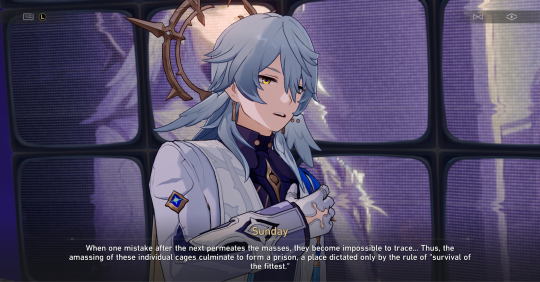
Robin: That's just sophistry. If that were true, then only the powerful would have the right to determine the future. Sunday: Unfortunately, that's exactly what happens. Another name for "the future" is "self-value." [...] Sunday: Some are born weak and vulnerable, some find themselves trapped in unfortunate circumstances, some fall victim to malice and cowardice. When it comes to survival, everyone is equal, and the weak can only watch as their value [future] gets constantly diminished by external forces. (The Only Path to Tomorrow) Firefly: So, what is your definition of living a happy life? Sunday: Good question. Human consciousness is fundamentally an illusion, a cage known as "self-worth". People lured in by this illusion, make mistakes, yet still ask that external influences bear the burden. Sunday: When one mistake after the next permeates the masses, they become impossible to trace... Thus, the amassing of these individual cages culminate to form a prison, a place dictated only by the rule of "survival of the fittest." Sunday: Nature is always accompanied by predation and sacrifice... Its antithesis is known as Order. (Beauty and Destruction)
As long as the will to life must be satisfied, “survival of the fittest” will persist; in other words, the illusion of self-value ensures the law’s survival in the future. While this tells us part of why Sunday equates self-value with the future, his statement can also be interpreted through a psychoanalytic lens, particularly as it relates to transference and the repetition compulsion. Transference is the process by which people unconsciously cast the roles of past figures onto current relationships, repeating past trauma in the present. The individuals filling the roles may change, but the roles themselves remain constant through time. Through transference, a person’s unresolved past and unconscious beliefs adopted from those experiences construct an illusion that passes for objective reality:
"What psycho-analysis reveals in the transference phenomena of neurotics can also be observed in the lives of some normal people. The impression they give is of being pursued by a malignant fate or possessed by some 'daemonic' power; but psycho- analysis has always taken the view that their fate is for the most part arranged by themselves and determined by early infantile influences" (Freud, 1920, p. 15).¹³
Transference is driven by an underlying compulsion to repeat the past known as the repetition compulsion. In Beyond the Pleasure Principle, Freud found that the repetition compulsion does not solely operate in service of the pleasure principle as it was previously understood, but also as an unconscious compulsion to repeat pain. Psychoanalyst and scholar Jonathan Lear provides an example of this in Freud (2015) when he describes the nature of unconscious mental processes:
“Suppose, to take a highly simplified case, a child has an unconscious fantasy, ‘I am the unloved one.’ Precisely because this fantasy is exempt from contradiction and is presented in a timeless mode, the person will tend to interpret life’s passing events through a frame of feeling unloved. The person will focus on real-life slights; but even kind gestures will tend to be treated with suspicion, as though there must be some underlying motive (‘He was nice to me only because he wants something from me’). The world will come to seem an unloving place, thus reinforcing the fantasy. The person can come to feel that she is somehow fated to be unloved.” (Lear, 2015, p. 6).¹⁴
To put Lear’s example in Sunday’s terms, an unconscious fantasy adopted from past experiences is the underlying material that constructs the illusory prison of self-value. The prison shapes our perception of reality, and this perception then reinforces the prison’s ‘form’ by affirming the unconscious fantasy. If one’s perception or the fantasy were to change, the dimensions of the prison would change with them, reshaping ‘reality.’
The prison of self-value therefore ensures the past’s survival in the present by facilitating its repetition; through repetition, the past becomes the prisoner’s future. In other words, by materializing the unconscious fantasy in reality through actions, the prison of self-value becomes one’s fate. We can then apply this framework to Sunday’s ideology: if fantasy and perception co-construct one another to create an individual human consciousness, it follows that Sunday’s ideology, as a reflection of his perception of the world, is rooted in an unconscious fantasy too, a belief that he has about himself.

Sunday: Well, don’t forget this…. not everyone really has a future.
So, just what is that belief? The past holds great significance to Sunday, and he vividly remembers the consequences of each decision he made. While in his inner world, he recounts three decisions that led him to lose faith in the Harmony and choose the Order for salvation. These decisions involved a Charmony Dove he and Robin found as children, a fraudulent stowaway, and Robin’s brush with death while she traveled beyond Penacony. He then asks which choice the Trailblazer would make given each scenario—the same choice as Sunday did, or some other choice? However, the choices are limited to either-or decisions between Sunday’s choice and its extreme opposite: either support Robin’s journey, or prevent her from taking it; either remain silent, or ask the Bloodhounds for mercy; either cage the Charmony Dove, or build a nest for it in a yard of predators, and no matter the choice, it always ends in tragedy.

Sunday: I know the suffering of being tormented, the turmoil of losing your way, how sorrow… and even despair, set in when matters don’t work out. All of this causes me unending pain, because this is not what “happiness” is at all.
This is because Sunday understands the world in terms of dichotomies, where things are either good or bad, righteous or sinful, strong or weak. It’s also why Sunday’s choice in each scenario is cast as the “good” choice, because it was made with kind intentions, while its opposite is the “bad” choice because it lacks compassion for the individual. The unfortunate outcome of either decision, both real and imagined, is therefore meant to persuade the player that Sunday’s perspective is ultimately correct, because “good” choices do not necessarily result in “good” outcomes in a disorderly world. Rather, choice itself is a chaotic variable that introduces uncertainty, splitting life into infinite paths and possibilities, or “untraceable mistakes.” In order to control outcomes, choice must be removed, even if such an outcome can only be achieved through fantasy.
To see the world in this way is to inhabit the monochrome world Acheron first referred to in Act I, a world where it’s all or nothing, and everything appears black or white. This manner of thinking constructs each decision as a false dilemma, which artificially limits the available options or perspectives to two extremes. For our purposes, this is among the most meaningful hints as to what Sunday’s unconscious fantasy is, because it is born out of his intense need for control, which is both a defense against the fantasy and the primary way that he repeats it.
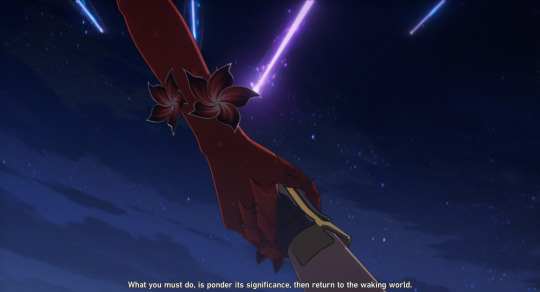
Acheron: The golden dream is getting restless. In the coming long night, I'm afraid you will face many tribulations and witness many tragedies. And finally...your sight will only see black and white. Acheron: But please believe me that in that monochrome world, there will be a glimpse of fleeting red, and when you make a choice, it will reappear before you once more… (The Knocking at Ungodly Hours)
With this in mind, we can use Sunday’s black and white thinking to our advantage. Upon closer observation, a common theme is repeating itself in each decision Sunday did make, with each individual cast in the same role at different points in time. Despite his best intentions, Sunday’s actions alone can’t protect them from tragic outcomes—indeed, he is powerless against their fate. According to his ideology, there are inherently strong individuals and inherently weak individuals, and the strong have the power to defend the weak, but often choose not to; by this same logic, if Sunday can’t defend the weak despite his intentions to do so, then he must not be strong. He must be weak.
This brings us to the Charmony Dove’s fate, which is undoubtedly the most significant to his character out of the three scenarios, and acts as a symbol of the difference between Sunday’s and Robin’s beliefs regarding humanity. The bird is an object that they project these beliefs onto, shaped by their individual “cages,” and its fate reflects those beliefs back at them, reinforcing their diverging fantasies:
Sunday: This place is too dangerous for a fledgling. Let's take it with us — we can put it on the wooden shelf in front of your window. Robin: Okay! A bird like that must have a beautiful singing voice. But where will it live? Sunday: I'll ask the family head to build a cage for it. Robin: A cage... but then it won't have the freedom to fly, right? [...] Robin: Even if it's small and not fully feathered, and can't sing... it didn't come into this world just to be locked up in a cage. Robin: Birds... belong to the sky. (The Only Path to Tomorrow)
To Robin, the Charmony Dove is full of potential, and its fate can’t be determined by a single moment of its life, but Sunday regards it with caution and uncertainty; one wrong move, and the bird will take its last breath. This difference becomes the central disagreement in their debate over the sweet dream’s value, and Sunday reveals the bird’s tragic fate to Robin in order to drive home his point:
Sunday: Shortly after you left, it crashed to its death right in front of your window. Robin: ...I had surmised as much. I knew you wouldn't have avoided mentioning the bird for no reason. Robin: Despite that unfortunate outcome, I still believe it was the right decision. Birds aren't meant to spend their lives in cages... They belong in the sky, even if they can't fly. Sunday: But here's the thing. If there are birds in this world that can never fly, can we really assert that they belong in the sky?
Sunday’s meaning is clear: flightless birds are no different from those individuals who are born weak, and their fate is to watch their future disappear under the pressure of external influences. While Robin came to embody her beliefs by leaving Penacony behind, Sunday stayed and rose through the Oak Family’s ranks, never leaving the sweet dream’s cage. He embodies his beliefs by denying himself a future, because to choose otherwise would contradict his fantasy—that he is a flightless bird too, and therefore has no “value”:
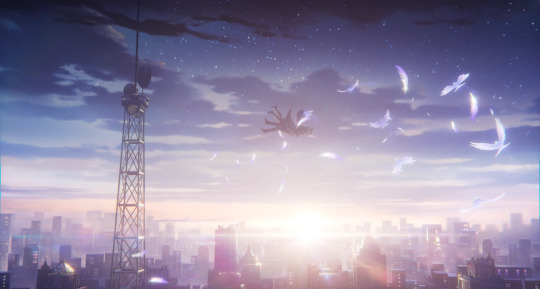
[Sunday]: The victor bears the responsibility of victory. Finish me... and fly into the sky. [Robin]: We were supposed... to fly into the sky together. [Sunday]: ... [Sunday]: If only... I could… (The Feather He Dropped)
Sunday's unconscious fantasy—that he is an inherently weak person, a bird that will never fly—is a reflection of his self-value. By unconsciously repeating the pain of his past, his fantasy becomes the illusory prison known as one’s future, a self-fulfilling fate.
But all of this is only a small piece of the puzzle. It tells us what the unconscious fantasy is and how it affects him, but it doesn’t really tell us why he has it in the first place. Just as the belief was hidden in the shadows of Sunday’s ideology, its origin is hiding behind something even more conspicuous—a grand performance on the dreamscape’s finest stage.
An Infantile Drama
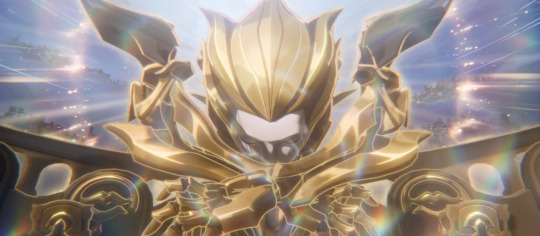
Trailblazer: Where is the Stellaron? Why am I not seeing it? Sunday: It hides behind the curtain. Or rather, it is the theater itself. (Everything that Rises Must Converge)
Naturally, this leads us to the Embryo of Philosophy.
There is so much to talk about between the three phases of this entire fight, not to mention the mountains of references it makes to other media. However, I want to train our attention on the Embryo’s tears. Why is it crying, and why at this particular moment? The religious meaning of its tears is clear, but what is their psychoanalytic significance?
First, let’s consider their context. The Embryo’s golden tears stream down its face with each turn of “Im Anfang war das Wort” (“in the beginning was the word”), stretching its arms towards the sky with palms open in worship of Order. On the 8th turn, it reaches toward the sky to ask for Ena's blessing; Ena answers its call, reaching down to grant it power, nearly touching the Embryo’s outstretched pointer finger with THEIR own. In doing so, they create a mirror image of Michelangelo's The Creation of Adam, a depiction of God giving Adam the spark of life.
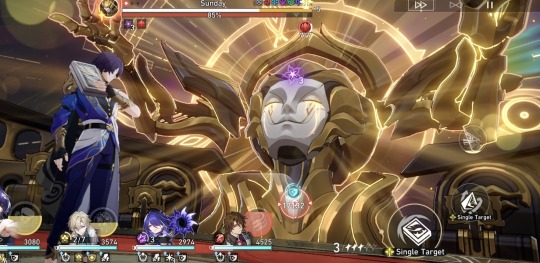

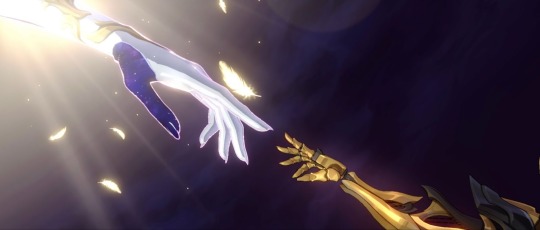
This artistic and religious reference, alongside the Embryo’s fetal imagery and tears, leaves no doubt that the third phase in the fight is Sunday’s “moment of birth” as an Aeon, and this suggests that birth must inform the answer to our original question. So then, why does the Embryo’s “birth” bring it to tears? The answer lies in the meaning of Sunday’s performance in Penacony Grand Theater, of which the Embryo is just one part, and how it relates to his unconscious fantasy.
In a final effort to dissuade the Astral Express from resisting his plan, Sunday stages a dramatic retelling of the Order’s Genesis story and Penacony’s history that chronicles its changing masters through the eras. As an immersive stage play, its completion hinges on the crew’s participation, which involves slaying the master at each act’s conclusion in order to usher in the next one. Through his play, Sunday argues that humans crave a master who can provide them with meaning in the face of chaos, and because of this inherent weakness, progress is an illusion. The past, present, and eternal show of human history is one of endless repetition and self-delusion – though the individual master may change, humans remain puppets by their own design.

The Past, Present, and Eternal Show
This fraught relationship between humanity and its masters was a foundational point of Freud’s theory of the death instincts, which he grounded in his observations of infantile play. While he was staying with his daughter’s family, Freud noticed a peculiar game his grandson played with his toys that further called the pleasure principle’s dominance into question. The game began when his grandson threw the toys out of sight to make them “disappear,” after which he would retrieve them with his mother’s help to make them “return.” Freud deduced that this game (Fort/Da) was a reenactment of his mother “disappearing” when she left him at home, and speculated that it played a crucial role in his grandson’s good behavior during her absences.¹⁵ If the game was in service of the pleasure principle, Freud expected that the entire game would be played to completion, where the pain of the toys’ disappearance is endured for the eventual pleasure of their return. Instead, his grandson often only repeated the disappearance – the “drama’s” most painful part.¹⁶
In infantile play, several instincts intersect with a child’s memory in order to process psychological stimuli.¹⁷ Repetition facilitates their sense of mastery over unfamiliar stimuli, whether pleasurable or painful,¹⁸ and play offers a safe, fictional space for children to make sense of reality, where they can leave behind their role as spectators of life’s phenomena and become actors on its stage.¹⁹ By playing an active part in a memory’s repetition through play, indeed by controlling it, children move toward an even grander wish in their hearts: “the wish to be grown-up and to be able to do what grown-up people do.”²⁰ Freud suspected this was why his grandson played the game, because it offered him a sense of agency over his mother’s absences that reality could not.
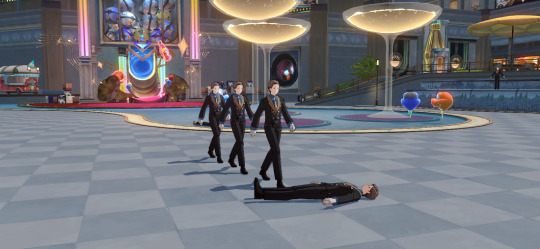
The Golden Hour base model and its uncanny inhabitants, found in Dewlight Pavillion. One of the Oak Family Head’s toys.
However, Freud’s point was not that repetition in infantile play is pathological, but rather that when trauma is repeated in adult life—a time when experiences do not feel so new, and therefore do not bring as much pleasure or sense of mastery per repetition²¹—the mind is reverting to a previous state,²² namely to the way it functioned in childhood. In other words, the repetition compulsion is related to the instinct for mastery, and trauma repetition is the mind’s attempt to master a painful experience by replaying the past in the present, as it did through infantile play. In this way, life itself becomes the game, or a “play,” and fantasy merges with reality.
Now, let’s examine the conclusion of Sunday’s stage play, as humans take fate into their own hands on the Genesis story’s seventh day:
2:1 THEY bestowed upon all beings the gift of ‘meaning.’ All had been brought into existence. And then, THEY rested from all THEIR creative work. 2:2 However, once again, all the beings beseeched Ena, praising THEM, the magnificent Aeon with divine power, but with a tone of curse. 2:3 ‘With Order, you have defined all things in the Cosmos, yet this only made us realize that we are mere puppets within your grasp.’ 2:4 Thus, on that day, all beings united and cast the Aeon into the pit of destruction. 2:5 And so it was done. That marked the seventh day. (Lost Property readable)
Like a parent guiding their child, Ena imbued the universe with meaning through Order, weaving the answer to each of humanity’s questions into THEIR grand symphony. Humanity then recognized its passive role in relation to Ena, a higher being who is able to act on the universe’s grand stage, while mortals merely watch THEM. And just as Freud’s grandson casts away his toys in the first part of the drama, humanity then casts Ena into the abyss to make THEM “disappear,” rejecting their old master in a bid for control only to seek THEM out again in the eternal show. In their effort to become masters, humans seal their fate as puppets; or by another interpretation, this is the intended outcome all along, because out of the two desires at play here—the desire to replace the master themselves and the desire to submit to another—answering to a new master is far easier than becoming one:
[Tiernan]: Sin Thirsters... the obsessions of the Pathstriders. They emerge from the depths of IX, seeing themselves as masters of their own destiny, unknowingly repeating the actions of their past lives. [Tiernan]: They emerge from the Nihility and head toward it, leading purposeless lives… (And on the Eighth Day) Butler: "Either I shall be my own master, or I shall return to my former master! I shall not submit to a new master under any circumstances!" "I wish they could regain their reason [calm down] and cast away the shackles of hypocrisy," proclaimed the new master. (Tune Butler's emotion to Calm) Butler: "Without a master, who can grant me true freedom?" (Everything that Rises Must Converge)
By returning the planet to Order, its Pathstriders hope to reinstate the earlier phase of galactic history before Ena was absorbed by Xipe the Harmony. Understood through Freud’s observations of infantile play, this can be seen as a struggle between retaining the innocence of childhood, the previous state, and the “grand wish” to become an adult with agency; desires that are at once contradictory, and yet work in tandem with one another. But is this really all that Sunday’s performance is about?
For the moment, let’s return to trauma repetition and its conflict with the pleasure principle. To Freud, trauma is like a bodily wound, where unfamiliar stimuli “breach” the mind’s protective layer and overwhelm it; the repetition compulsion is a response to this breach, replaying past trauma in the present so that the mind learns to anticipate the disturbance in the future:
“The fulfilment of wishes is [...] brought about in a hallucinatory manner by dreams, and under the dominance of the pleasure principle this has become their function. But it is not in the service of that principle that the dreams of patients suffering from traumatic neuroses lead them back [...] to the situation in which the trauma occurred. [...] These dreams are endeavouring to master the stimulus retrospectively, by developing the anxiety whose omission was the cause of the traumatic neurosis” (Freud, 1920, p. 26).²³
This brings us to the final pillar of Freud’s death drive. If the repetition compulsion is an instinct, then it must not only be common to all organic life, but also must originate from a shared disturbance in evolutionary history. But a disturbance of this scale, he realized, could only be found in what shaped life’s beginning—the physical and chemical processes that cultivated life on Earth, rousing the first unicellular organism from its slumber in the primordial soup, and animating what was once dead. The repetition compulsion, then, was born from this original trauma of organic life, unanticipated by that ancient sea. And if that is the case, then the repetition compulsion’s true purpose is clear: it aims to return the living to its slumber, to the death state, and it dutifully follows life’s “circuitous paths” to bring about that end:
“It would be in contradiction to the conservative nature of the instincts if the goal of life were a state of things which had never yet been attained. On the contrary, it must be an old state of things, an initial state from which the living entity has [...] departed and to which it is striving to return by the circuitous paths along which its development leads. If we are to take it as a truth [...] that everything living dies for internal reasons—becomes inorganic once again—then we shall be compelled to say that 'the aim of all life is death’ and, looking backwards, that 'inanimate things existed before living ones’” (Freud, 1920, p. 32).²⁴
The implications of this theory can be seen in Penacony’s oceanic imagery, which signifies both the unconscious memory of that primordial state and the salvation the sweet dream offers from reality. To enter the dream, The Reverie’s guests submerge themselves in a shallow pool and emerge on the “other side” reborn, baptized into the religion of pleasure and cleansed with the dream’s fiction. The primordial memory, then, is the lost childhood of organic life, a previous state it wants to return to — the unity before the violence of individuality.

Sunday: Some are born weak and vulnerable, some find themselves trapped in unfortunate circumstances, some fall victim to malice and cowardice. When it comes to survival, everyone is equal, and the weak can only watch as their value [future] gets constantly diminished by external forces. [emphasis added].
We also don’t need to stretch our imagination to connect all of this back to Sunday, who compares the weak to spectators of their own demise, just as Freud likens children to spectators of life’s phenomena, and perceives “external forces” as catalysts for change—for Sunday, they whittle away at one’s future, while for Freud they disturb a peaceful slumber.
How is all of this related to the Embryo’s tearful birth? The primordial soup was a cradle for organic life in its infancy, but it was also the “mother” that birthed it, and the death instincts compel life to return to its embrace. In Inhibitions, Symptoms, and Anxiety (1926), Freud identifies birth as the first “danger-situation” an individual experiences, because birth requires separation from their mother.²⁵ By coming into the world, newborns are inundated with unfamiliar stimuli, like the unexpected “breach” that characterizes trauma, and these sensations in turn produce the first instance of anxiety.²⁶ Though they can’t yet conceptualize this danger as the loss of their mother, for mental life at this stage doesn’t distinguish between the self and other objects, infants soon learn the uncertainty that accompanies danger can be relieved through their mother, who “satisfies all [their] needs without delay”; anxiety, then, is a response to situations where these needs go unsatisfied, and over which they alone have no control.²⁷
But birth is only the first separation between mother and child; the final separation, of course, is death. If the former’s danger is characterized by the mother’s absence (“object-loss”), then in death this danger becomes permanent. In Mourning and Melancholia (1917), Freud writes that mourning is a process of “[accepting that] the loved object no longer exists” and of withdrawing one’s interest (“libido”) from them.²⁸ Melancholia, its fraternal twin, shares several affective traits with this process, namely “a turning away from reality […] and a clinging to the object through the medium of a hallucinatory wishful psychosis”—that is, by living through fantasy.²⁹ Where melancholia distinguishes itself from mourning, however, is in one’s sense of responsibility for the object’s loss. In other words, the melancholic is tormented by a pervasive sense of guilt:
“In mourning it is the world which has become poor and empty; in melancholia it is the ego itself. The patient represents his ego to us as worthless, incapable of any achievement and morally despicable; he reproaches himself, vilifies himself and expects to be cast out and punished […] He is not of the opinion that a change has taken place in him, but extends his self-criticism back over the past; he declares that he was never any better” (Freud, 1917, p. 246).³⁰
Sounds a little familiar, doesn’t it? Transference is another way of living life through fantasy, where each new actor plays the same role in its infinite drama, in this case the “lost object.” The Charmony Dove, the fraudulent stowaway, and Robin all unknowingly take on this role in Sunday’s unconscious, as objects he is trying to protect. However, this performance is always fated to end the same way: his actions fail to save them, and he blames himself and his weakness for their loss.

If performance is the throughline between reality and fiction, then Sunday’s “play” in Penacony Grand Theater—the birth of his paradise and near-ascension as an Aeon—is yet another continuation of this eternal show. Sunday’s greatest wish, his infantile wish, is to protect everyone, and Ena’s dream facilitates its fulfillment through fantasy. To realize the dream, Sunday must usurp the power of a master (an Aeon) for himself, and he does so by fusing the Harmony and Order together to create the Embryo of Philosophy, making Xipe and Ena its 'mothers.' But the Embryo’s birth also requires the “death” of its creators, precisely because their power had to be stolen to create the eternal dream’s foundation. In other words, the Embryo must replace its parents so that it may truly become a master like them. Sunday's full performance encompasses both separations between “mother” and child at once: the separation through birth, and the separation through death.
In their Christian interpretation, the Embryo’s tears signify Christ’s empathy for human suffering, but in the psychoanalytic interpretation they suggest the Embryo’s anxiety about its performance. And this anxiety is well-founded, for all of the reasons we’ve discussed: the primordial danger of being born into the world, of emerging from “death” and becoming separate from it, and the threat of permanent object-loss if the Embryo completes the performance as planned. But we should also remember that this anxiety is in reality nothing new for Sunday, because he has already experienced all of these losses first-hand in the past. In other words, the Embryo cries because its performance reminds Sunday of something he’s experienced before, the very memory that he is trying to control—indeed master—through repetition. This memory, and the anxiety, concerns his wish’s original failure to materialize, the trauma of which laid the foundation for each subsequent “performance.” Plainly, it’s about the death of his mother, and his failure to protect her from the Stellaron disaster.
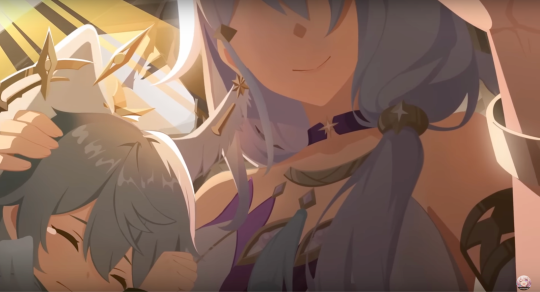
Given how he belabored the importance of his three decisions in his inner world, this may seem like a bit of a stretch. In fact, he doesn’t directly say a word about his mother at all — but that is exactly why I am so suspicious. Instead of acknowledging her with words, her death lingers in his desperate need to control outcomes, his preoccupation with weakness, and his yearning for guidance from a master, something he lost as a child when he needed it most. Perhaps this is part of what motivates him to become that master for everyone else, to replace the parent he lost by “becoming” them.
It’s also not lost on me that Sunday cries during the Stellaron disaster, further suggesting a narrative parallel between the Embryo crying and his past. In that moment, his tears highlight the incongruence between the image Sunday puts forth of himself as Robin’s protector, and the reality that he alone was never able to protect anyone. His mother died, Robin got shot, and suffering followed his decisions despite his kind intentions. From an early age, he had already given up on the possibility of sharing a stage with his sister, and eventually resigned himself to a grim fate as the universe’s lone star. While Gopher Wood’s role in reinforcing his unconscious belief should not be understated, I hesitate to say his poison is truly the belief’s origin.

“The echoes of the memories someone once held of their beloved family. Across the long night, they will accompany him in the past, present, and future.” (Echoes of Faded Dreams story)
What’s more, Sunday tells us that his end goal is not to resurrect Ena, but rather to construct his paradise on Ena’s remains, creating a world without Aeons at all. This infantile fantasy, a world without the “adult” influence of these higher beings, is a metaphor for his search for happiness after the meaningless Stellaron disaster that took his mother away from him, and to recover the innocence he lost with her passing. He seeks to create paradise from destruction, to build a new world on her remains, and become a master of it himself. Both his stage play and his role as the conductor of the paradise’s symphony only further cement this: through his performance, he asserts that he is no longer a passive observer of the disaster, no longer a spectator of his own demise or merely Gopher Wood’s puppet, but an actor and an artist in his own right. By utilizing the Stellaron to create paradise, he hopes to master his weakness.
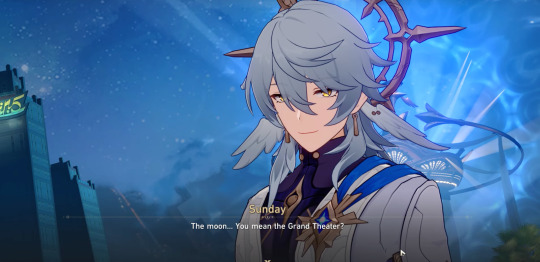
This symbolism goes crazy. What do you mean the Stellaron is a theater, it shines like the moon, it’s the reason Sunday’s mother died*, and it’s the site where he initiates Third Impact?
And I know, I know all of the Evangelion fans are saying “we fucking knew this already,” and you’re right! Hideaki Anno was also inspired by Freud, among many other psychoanalysts and philosophy giants, and Hoyoverse has never been shy about how much Anno’s work influences their own. It is undeniable that Shinji and Sunday share a character arc as it relates to the loss of their mother, and Sunday is far from the first and certainly not the last Hoyoverse character who will either, but where they differ is in the details of their death wish. In The End of Evangelion (1997), Shinji wishes for a world where he can’t be rejected by others, because there would be no meaningful difference between him and another person if they’re all just LCL soup, while Sunday wishes for a world where the weak never have to face their weakness, and weakness is no longer a “sin”; the outcome of both of these wishes, then, is a world where sin can never be repeated. But this tragedy’s ending was told from the beginning — trying to sever the cycle is the same as repeating it, and shedding one master means gaining another. Rather than preserving life and protecting it from pain and disappointment as he intended, Sunday’s dream world only guarantees its own end.
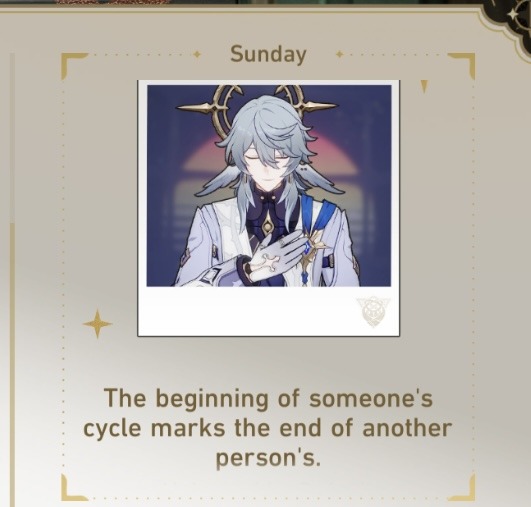
This is why the Embryo cries. Sunday’s performance is a reenactment of both the first and last severance between his mother and himself—his birth and her death—and the origin of the pain that would eventually justify the eternal dream’s creation.
*I say this with the huge caveat that Penacony lore, Halovian lore, and Sunday + Robin lore, are a bit (okay, very) confusing. It is possible their homeland was destroyed by a different Stellaron. Also, who am I to assume Halovian birth even remotely resembles human birth? I don’t know. Talk about how vague Halovian lore is right now in the version satisfaction survey and maybe we’ll get real answers.
Infinite Sin and the Will to Punishment
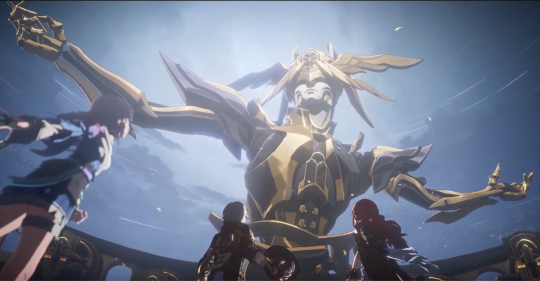
Unfortunately, it isn’t quite that simple. Freud did not believe that this pessimistic interpretation of the death instincts was the full story of the death drive, and this analysis, though fruitful, is full of apparent contradictions as a result of treating it that way. Though it’s not incorrect to assess Sunday’s actions from a self-destructive angle, this alone is an inadequate framework for illuminating the full extent of his hypocrisy. We see glimmers of it in Sunday’s inner world, when he admits the price of attaining his dream—“merely a personal and eternal sacrifice”—and in Penacony Grand Theater, when Himeko points out the fallacy that this could ever truly be a dignified existence for the many living under Sunday’s will. The tension between his willingness for self-sacrifice and desire for total domination is a core conflict of Sunday’s character arc in Penacony. These two aims constantly struggle to overcome one another, and within that struggle lies a truth about the nature of life and the meaning of Penacony’s story.
The seductive promise of Sunday’s paradise belies its reality, which requires the paradise’s conductor to remain awake until the end of time. Sunday minimizes the personal cost of Ena’s dream by portraying himself as a martyr for a noble cause, because to him this solitude truly is a meager price to pay for everyone’s eternal “happiness.” However, Robin is the first to point out that his role in sustaining the dream looks less like a heroic sacrifice than it does eternal punishment:
Robin: It's true that some people are born strong, and others are born weak. If the Trailblaze is the target of heroes, then the Harmony will guarantee that the strong help the weak. Only the people of Penacony themselves can be the saviors of their homeland. Robin: Their path of happiness should be forged by themselves. While I may not be a Nameless, I'm willing to instill courage in all those who need it. Robin: This includes my brother as well. Ena's Dream... is too cruel for him, and everyone else. […] Robin: Brother, you have heard their cries... This is not the paradise they hoped for. "Harmonious Choir" The Great Septimus: Even so, they don't know where they should be heading. That's why... I had to become the lone star in the sky to guide them. Robin: Even if that star... must hang in a perpetual night of solitude? (And On the Eighth Day)
And one does have to wonder: why would Sunday, who has clearly demonstrated his own desire to turn away from the pain of reality, deliver a fantasy world that promises just that to everyone but himself? To begin to unpack this, let’s return to the idea of guilt, which we briefly touched on in the discussion of melancholia.
Before developing his death drive theory, Freud attributed a wish for punishment to dreams and behaviors which, on their surface, contradicted the pleasure principle’s tendency to avoid pain.³¹ These dreams, he argued, represented a masochistic tendency in human nature, where “[pain] for one system [is pleasure] for the other.”³² But Freud’s understanding of masochism changed with Beyond the Pleasure Principle, which raised the possibility that masochism was originally a death instinct that was altered by the life instincts to serve the pleasure principle.³³ He was then able to take up masochism with a newly instructive angle in The Ego and the Id (1923), where he formally introduced not only the term “id” for the realm of the instincts, but also the “super-ego,” an omnipresent and judgmental conscience that defines the ego ideal.³⁴
The super-ego is a representation of the ego’s parents and their teachings, reborn from the ruins of the Oedipus complex and its unfulfilled wishes. The Oedipus complex is named for the ill-fated protagonist of Sophocles’ Oedipus Rex, who unknowingly murders his father and marries his mother, thereby fulfilling a prophecy he sought to avoid. After he is made aware of his moral failings, he blinds himself in shame and goes into exile from his former kingdom. In The Interpretation of Dreams (1899), Freud describes the Oedipus complex as an early stage of child psychosexual development where the child’s parent of the opposite sex is cast as their first sexual object.³⁵ But this nascent sexual attachment creates a dilemma for the child, because in order to fulfill the Oedipal wish (attaining a “union” with the loved-object), they have to triumph over their rival, the parent of the same-sex. The child then develops an “ambivalent” attachment to their same-sex parent, where the familial love they have for them is complicated by their desire for the other parent.³⁶ However, the child soon realizes that its options to fulfill the Oedipal wish are untenable with reality, and the price of achieving it is severe punishment at the "rival's" hands.³⁷ It then abandons the Oedipal wish by repressing it, instead developing a strong “identification” with the same-sex parent—that is, instead of trying to kill the father to be with the mother, it tries to become like him.³⁸ This identification establishes the ego’s moral framework.

On the left, Sunday crying in his ultimate animation. On the right, a photograph by Albert Greiner of actor Louis Bouwmeester as Oedipus after blinding himself in Oedipus Rex. This shit, as they say, writes itself.
Penacony’s environmental design references the super-ego through its persistent eye motif, which represents surveillance in the sweet dream and introspection in the primal dreamscape. In addition to its psychoanalytic roots, the eye motif in Sunday’s character design both furthers his angelic iconography and visually connects him to Ena, whose eye represents THEIR sovereignty over mortals through the law.
Surveillance is central to any system of government that prioritizes control like the Order does, and the resulting paranoia of such a system encourages rigid adherence to its rules. Likewise, the super-ego watches the ego’s thoughts and actions for signs of transgression and punishes it for every immoral impulse, whether acted on or merely imagined. The threat of punishment is what motivates the ego to enforce the super-ego’s imperatives, repressing impulses that fall outside the sphere of moral acceptability and casting all that is not orderly outside of what comprises it. In Penacony, the analog for the super-ego is most closely found in Gopher Wood, the Dreammaster, who oversaw the sweet dream’s descent into hedonism in order to strengthen his influence and nurture the Stellaron. This is also why he is often embodied as a raven who spies on Penacony’s scenes, acting as Sunday’s “eyes” to maintain control of all the actors.

“Something Unto Death”
It should come as no surprise, then, that the super-ego also plays a crucial role in the eternal show. The super-ego is built on the teachings and morals of the past as embodied by the individual’s parents, and these values guide the ego in the present so that the ideal may be attained in the future; in other words, the super-ego ensures the past’s survival through its repetition in the present so that it becomes one’s future.³⁹ Of course, the super-ego is not literally the ego’s father, but rather a representation of him recreated within the mind.⁴⁰ Perhaps this is why Gopher Wood is able to “speak” through each Oak Family member in the present, despite his body’s immolation in the past — his rules survive in their minds as the supreme source of moral guidance. That, and dream logic.
As both a political and religious fundamentalist leader in the dreamscape, Gopher Wood radiates the “Father” archetype, marking him as an authority not only of Penacony’s civic prosperity, but of righteousness itself. Because of this, he is a surrogate for divinity—for Xipe the Harmony in public, and for Ena the Order in private—capable of judging the ego in "God’s" place. While this relationship to some extent applies to all Oak Family members, it is especially true for Sunday and Robin, for whom Gopher Wood literally plays the role of their adoptive father. For Sunday, as Gopher Wood’s successor in the Oak Family and tool of the Order, this takes on an even greater significance. Their relationship constitutes a faithful representation of the ego and the super-ego, where Sunday is taught by Gopher Wood to uphold the Order’s ideals to be a morally righteous person, and to repress all of his ‘imperfection’:
“As a substitute for a longing for the father, [the super-ego] contains the germ from which all religions have evolved. The self-judgment which declares that the ego falls short of its ideal produces the religious sense of humility to which the believer appeals in his longing” (Freud, 1923, p. 33).⁴¹ “It's said that the master of this pavilion suffers from severe compulsions, but this table clearly shows that he has been cured.” “Unlike a long table, round tables have no sense of priority or opposition, it is very likely that they are an Aeonic candidate for the Path of Harmony” (Conference Round Table investigations in Dewlight Pavillion) [emphasis added].

Killing the “Father”....to be with the “Mother”?
But the super-ego’s standards aren’t truly meant to be achievable for the ego, because the ego’s identification with the parents is defined by its difference from them; to disrupt that identification would be to confuse the ego’s sense of self.⁴² This is yet another manifestation of the ego’s conflict between remaining subservient to its “master,” the super-ego, or overthrowing it to become the new master:
“[The super-ego’s] relation to the ego is not exhausted by the precept: ‘You ought to be like this (like your father).’ It also comprises the prohibition: ‘You may not be like this (like your father)–that is, you may not do all that he does; some things are his prerogative’” (Freud, 1923, p. 30).⁴³
Thus, the ego creates an impossible task for itself. It wants to be seen as a morally righteous subject, and it tries to achieve this by modeling its every thought and action after the “Father.” However, the ego can never truly censor all 'impure' impulses, and for this reason it will always be deserving of punishment; this is the source of the ego’s persistent sense of guilt.⁴⁴ The tension between the super-ego and the ego is what Freud referred to as “moral masochism,”⁴⁵ wherein the ego not only fears the super-ego’s punishment, but also unconsciously desires it. Moral masochists do not care who punishes them and do not limit their suffering to sexual fantasies—instead, “the suffering itself is what matters.”⁴⁶
This desire is the result of several transformations that occur in the death instincts. Earlier, I mentioned that we were working with an incomplete understanding of the death drive—that the purpose of life is to return to death. But life is almost never this frictionless, and neither is instinctual life. In reality, the death instincts all trend toward self-annihilation and restoring the state before life, but the life instincts persist alongside them to preserve life. Taken alone, they are only capable of stagnation; together, as each struggles against the aims of the other, life can evolve and progress into new territory, ‘blazing a trail’ towards new beginnings — “life itself [is] a conflict and compromise between these two trends.”⁴⁷ To make "life" possible, the death instincts are fused with the life instincts, making it difficult if not impossible to observe any one behavior that purely exhibits the death instincts.⁴⁸
One product of these fusions is the sadistic instinct. In The Economic Problem of Masochism (1924), Freud affirms what he had only surmised in Beyond the Pleasure Principle—that sadism is an inversion of a primary masochism, where what was once a death instinct bent on self-annihilation is now a “destructive instinct” fused with Eros that seeks to 'master' others:
“The libido has the task of making the destroying instinct innocuous, and it fulfills the task by diverting that instinct to a great extent outwards [...] towards other objects in the external world. The instinct is then called the destructive instinct, the instinct for mastery, or the will to power” (Freud, 1924a, p. 163).⁴⁹
But a portion of that aggression is retained in the ego, attached to the super-ego (the 'master'), and redirected towards the ego; hence, moral masochism.⁵⁰ In other words, the desire to punish others is reconfigured through the super-ego as a desire to punish oneself.
So what does “punishment” mean here? Freud concludes The Ego and the Id by arguing the fear of punishment is really a fear of losing love and protection from the parents, “Destiny,” or the super-ego. If their love is only garnered through moral behavior, then immorality risks its withdrawal. Without love, the ego is vulnerable to the world and its dangers, and to the possibility of its death—thus, the fear of punishment is really the ego’s fear of death, and consequently, its desire for death:
“The fear of death in melancholia only admits of one explanation: that the ego gives itself up because it feels itself hated and persecuted by the super-ego, instead of loved. To the ego, therefore, living means the same as being loved [...] But when the ego finds itself in an excessive real danger which it believes itself unable to overcome by its own strength [...] it sees itself deserted by all protecting forces and lets itself die” (Freud, 1923, p. 61).⁵¹
Now, let’s consider the origin of Sunday’s melancholy, his failure to protect his mother. This ‘sin’ is at the center of his performance, and it is the pain he keeps repeating over and over again. He repeats this pain because he feels guilty for being too weak to protect his loved ones, and that guilt finds its source in his severe and unforgiving super-ego. Sunday suffers immensely from the responsibility he feels for everyone’s happiness, let alone his loved ones’ safety; it is strongly implied that he has obsessive-compulsive disorder, a condition that likely wasn’t helped by the Order’s strict rules. But Sunday fundamentally suffers for the same reason that everyone else suffers — because ‘sin’ is infinite for imperfect beings, and no amount of repression can change that. The guilt he feels for this is also infinite. One of the reasons that Sunday volunteers himself as the Order’s sacrificial lamb is because he believes the suffering of others to be of higher importance than his own, certainly, but it is also because of the self-punishment he is promised through the plan’s outcome. In other words, his infinite solitude is a form of justice for his original sin and is, by design, a death sentence.
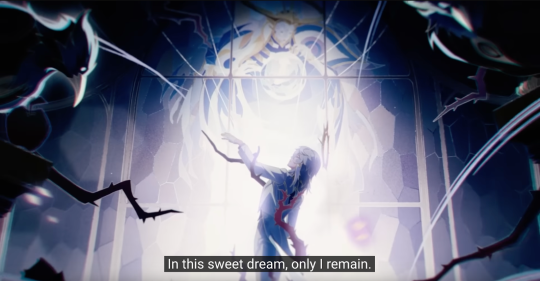
This leaves us with our final contradiction to untangle. The deceit of Sunday’s dream world is its benevolent veneer, which obscures the violence of its compulsive unity at the expense of individuality. Before his performance in Penacony Grand Theater, Himeko acknowledges Sunday has “a strong conviction and a desire for dominance” that cannot be satisfied through debate alone; he derives far more pleasure from demonstrating his superiority through example. We witnessed that aspect of his personality firsthand when Sunday subjected Aventurine to a trial from the Harmony and branded him with its death sentence, an outcome he took utmost care beforehand to ensure was predetermined. However, when Himeko calls Sunday on the hypocrisy of his martyrdom, he dismisses it and shuts down any further debate:
Sunday: True goodness can only be achieved through faith. Himeko: Allow me to point out that falling into a permanent slumber is not happiness, especially when those people are driven by someone else's will in their sleep. […] Sunday: My sole objective is to create a paradise free from Aeons, where the Order ensures the dignity and happiness of all humanity. A paradise exclusive to us human beings. Himeko: That's not the case. If people are to live with dignity, there must be nothing and no one above them. Himeko: In your so-called paradise, you would be the one reigning supreme. Sunday: Looks like we won't be able to convince each other. Now that our conflict has been destined, let's unveil our Paths and reveal to the universe the true path. (Everything that Rises Must Converge)
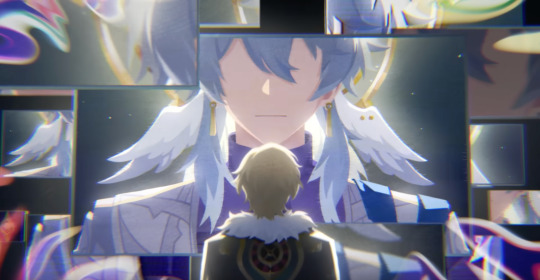
You know he enjoyed every second of this. (From Aventurine’s “A Moment Among the Stars - Inherently Unjust Destiny” trailer).
Circumstances aside, good intentions or not, Sunday is not without his own stubborn will that he imposes on others. Acknowledging this neither throws everything we’ve discussed beforehand out the window, nor does it suggest that Sunday’s martyrdom isn’t genuine. It does ask whether emphasizing Sunday’s martyrdom at the expense of his capacity for sadism is possible without disregarding his agency. In other words, Sunday did not create a dream world that excludes himself by design solely to punish himself and move closer to death; the control it offers him over others, though illusory, is just as appealing. Playing “God” in this way is an extreme and, in a sense, ‘aggressive’ expression of his own will to life, an equally fervent wish to surpass his “master,” protect the weak, and forge a new beginning.
In Sunday’s manifestation of Dominicus, we see both the sadistic instinct and the masochistic instinct represented as two sides of the same being. On one side is the confident and domineering Septimus, who, as the maestro of the eternal dream, embodies the sadistic instinct for mastery over others; on the other side is the Embryo of Philosophy, representing the masochistic instinct to return to the mother.
We’ve already discussed the Embryo of Philosophy at length, but Septimus also merits closer attention. In contrast to the Embryo’s fragile, withdrawn posture and emotional vulnerability, Septimus is towering, ostentatious, and grandiose; it makes wide, sweeping gestures that cover the entire stage, carrying itself with an authority that commands the audience’s attention. Indeed, Sunday puts on a voice as Septimus**, lowering his pitch and raising its volume so that it booms with the power he so desperately craves. Even its title, “The Great Septimus,” reads more like a character in a child’s fantasy than a threatening embodiment of Order with the means to suppress autonomy. In other words, Sunday treats Septimus as a persona, an image he wants to project into the world, or a “fictional” version of himself; plainly, it is a manifestation of his ego ideal.

The destruction of this nascent Aeon’s body therefore holds great significance as we move into the conclusion of Sunday’s character arc, at least for his role in Penacony. Dreams exist in the liminal space between reality and imagination, much like the “self” straddles the ideal and the real. Destruction and creation are rules of the universe that can’t be transcended, and the “self” is always in flux; but because of this chaos, there is always a chance to change one’s fate. Septimus represented Sunday’s infantile wish to protect everyone, no matter the cost, and the Embryo of Philosophy signified his desire to remain the same forever, as he was in childhood. Without their armor to protect him from reality, he once again faces the primal fear of life and the inevitability of one’s death. But rather than letting himself die in an ocean of guilt, there’s a chance to write a new ending to his ill-fated play.
**It’s apparent that the boss’s voice has certain effects on it that contribute to this, but I noticed something a little more than that while listening back to some cutscenes that I believe were acting choices on the VA’s part. Also, this judgment is based on the English dub.
TL;DR: someone get this man some serotonin immediately.
That’s it! I really wanted to include an analysis of Sunday’s new outfit here that ties it to Nietzsche’s The Birth of Tragedy and back to The World as Will and Idea, but I ran out of time. :( It will have to wait for another post. Thank you so much for reading <3
References:
Numbered external citations with page numbers can be found here:
https://pastebin.com/2jXQGTHk
List of Freudian Texts Referenced:
Mourning and Melancholia (1917) Beyond the Pleasure Principle (1920) The Ego and the Id (1923). Page numbers are given from my hard copy. The Economic Problem of Masochism (1924) The Dissolution of the Oedipus Complex (1924) Civilization and Its Discontents (1930). Page numbers are given from my hard copy. Inhibitions, Symptoms. Anxiety (1926)
Other Texts Referenced:
The World as Will and Idea by Arthur Schopenhauer. Page numbers are given from my hard copy. Freud (2015) by Jonathan Lear, 2nd edition. Page numbers are given from my hard copy.
Further Reading/Watching:
I highly recommend this article series by solenestuaries of Hyperion Team 3rd on substack. The first is Honkai Impact 3rd focused, the second is a mix of Honkai 3rd Part 2 and Honkai: Star Rail 2.0 focused:
Part 1: What do we talk about when we talk about dreams?
Part 2: “Why does life slumber?”: Dreams, Entropy, and the Many-Worlds of Quantum Mechanics
I am greatly indebted to her analysis for convincing me to go beyond Freud’s A General Introduction to Psychoanalysis. Her grasp of psychoanalysis and schizoanalysis is staggering and thought-provoking. Do yourself a favor and read all of her articles!
Destruction as a Cause for Coming Into Being by Sabina Spielrien. The inspiration for Beyond the Pleasure Principle.
Origins and Mysticism of the Death Drive in Psychoanalysis & the Philosophy of Transgression by ESTOERICA. I was wayyy too deep into writing this post by the time I discovered this video, but please for the love of god just watch it and prepare to have your mind blown.
88 notes
·
View notes
Text

why do life slumber??
#trying some lighting effect#but it looks kinda sloppy ngl#anyways another hsr fanart#man why hoyo characters are so hard to draw#but anyways I love sunday's character#characters that making a world where no suffering and pain but instead they restrict everyone's freedom and agency#eternal sugar also had one too#I just like characters that I wanna debate on#based on their view on world#same with baizhu#hsr#honkai star rail#sunday hsr#honkai star rail sunday#hsr sunday#sunday#fanart#hsr fanart#honkai star rail fanart#sunday fanart#my art
38 notes
·
View notes
Text
the world would be a better place if they fire all of the VAs who participate in the strike, pls fire their lazy ass it's been half a year already
something very sinister about SAG-AFTRA is how it seems as though their forcing their union workers to lie about the strike and say how it's all about anti-AI, when in reality protecting against AI is something HOYO has already agreed upon with their non SAG union voice actors. SAG-AFTRA is trying to get HOYO to agree to a contract in which HOYO can only employ SAG union voice actors for English voice work. as much as I dont like them, please understand HOYO is NOT the bad guy in all this, because if they agree to SAG-AFTRAs terms, many people will either be forced to join their union- which has been shown time and time again to be a deplorable organization who does not care for those that work for it- or stop voice acting for any future HOYO or Cognosphere projects. I've seen many voice actors lie about the true meaning of the strike, and it's very upsetting to see people I used to really enjoy content from become so disingenuous.
ANYWAY, fuck SAG-AFTRA, fuck AI, and support non-SAG union workers.
edit: I feel like a lot of the people saying "uuuuhhh but unions are better why wont they just join the union lol" dont understand how SAG-AFTRA is trying to monopolize on video game voice acting. It's not about "just join the union" because not every english speaking voice actor lives in america and will be ABLE to join, my father is one such example. SAG-AFTRA is also just a really shitty organization, they put profit before people.
129 notes
·
View notes
Text
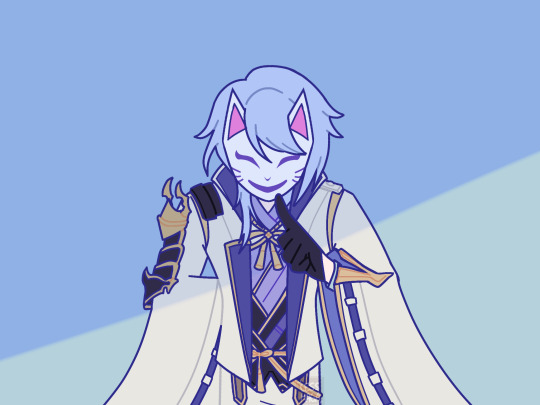
🎶 hey! put on a happy face!! then everything's ok!!
#we need this side of ayato more#any fanfic recs 😔#also drew fox mask ayato again#cuz I just like it#yeah sorry for the bad anatomy#genshin impact#kamisato ayato#kamisato ayato fanart#fanart#genshin impact fanart#genshin fanart#genshin ayato#ayato kamisato#also need more 10 pulls left to get to the soft pity#I've been grinding so much primos after losing the 50/50 to yoimiya 😭#my art#fox#fox mask
47 notes
·
View notes
Text

I like her design it's cute
#wanna do some lasso art and it sucks 😔#hatsune miku#vocaloid#vocaloid hatsune#vocaloid miku#miku#miku fanart#hatsune miku fanart#fanart#static#lasso tool#lasso art#my art#doodle art
7 notes
·
View notes
Text
live laugh thomato

tried to draw with lasso and had a pain drawing their clothes
supposed to draw multiple characters but realized how difficult their clothes were to draw and not as simple as I thought so I stick with them
#genshin impact#kamisato ayato#thoma#genshin impact ayato#genshin impact thoma#thomato#thoma x ayato#ayathoma#ayato x thoma#lasso tool#lasso art#genshin impact fanart#fanart#lineless art#lineless drawing#my art
26 notes
·
View notes
Text
Being obsessed with a singular genshin character is not for the weak… because eventually they’re gonna be completely irrelevant and the fandom and game is a ghost town for that specific characters content 😭😭😭😭😭😭😭😭😭 just give me more ayato dude I can’t do this
47 notes
·
View notes
Text
the fact that the thing would actually make the story quest good and interesting is actually FOCUSING the storyline to the CHARACTERS that's supposed to be their own story
nilou's story quest would be so much interesting if the npc dad was trying to ban their theatre (forgot the dude's name but who gaf) is actually nilou's dad than some random npc that's just got introduced to us
I know Ayato's a playable character who must be single and available. But his story quest would have been really awesome if he were trapped in a loveless marriage with someone far below his ranking, unable to maneuver for power, cornered by the other commissions into the marriage as a young man before he became the leader of the clan.
10 notes
·
View notes

